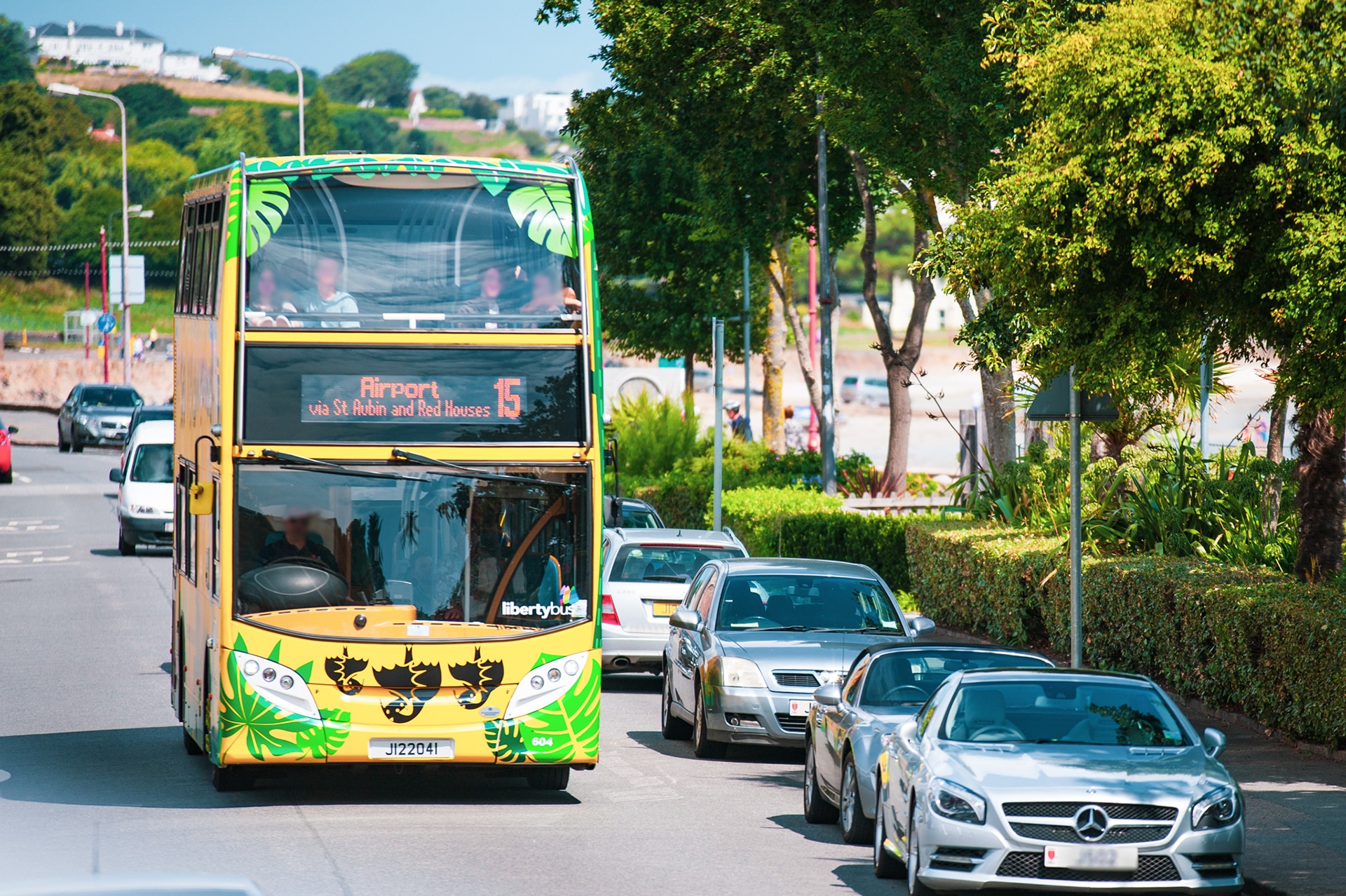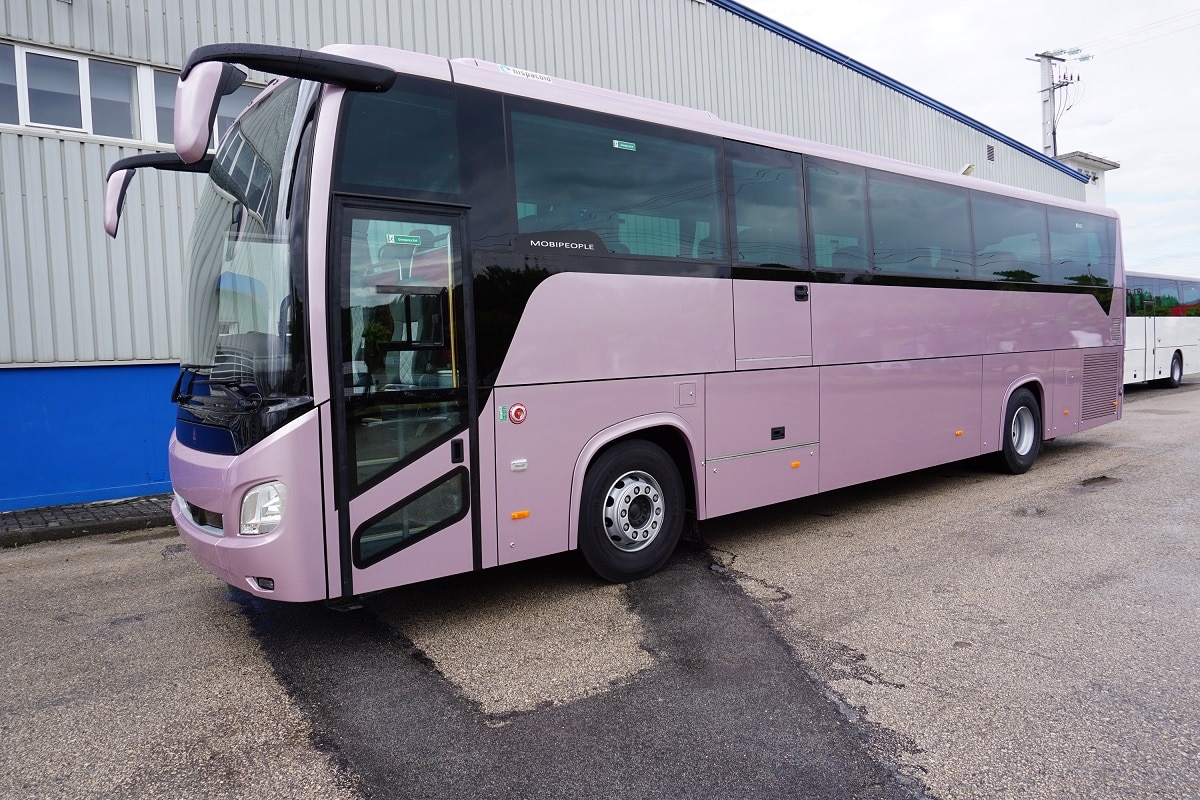LibertyBus on the Island of Jersey has suffered a typical drop in patronage during the coronavirus COVID-19 pandemic. But its directors believe it is ready to restart operations at full strength whenever the call is made, thanks to a strong financial plan, partnership working and routine flexibility
The changes made to LibertyBus’ timetable will be familiar to most if not all bus operators across the UK: Reduced frequency across services; later starts and early finishes; some routes cancelled completely. The company currently operates a core service for the benefit of critical workers and vulnerable communities and is discouraging everyone without a compelling reason to travel.
But LibertyBus serves as the arteries of a tourist hotspot. The timetable changes introduced on 28 March came at a time when the Island’s population begins to swell. Jersey’s bus service is robust, yet now has to manage with a restriction on what once was an essential influx of visitors. Only one emergency flight per day enters and leaves, and while passenger shipping is no more, freight shipping is still permitted – which at least allows the operator to maintain a parts and fuel supply chain.
When the Jersey Evening Post approached the company and asked if the bus services would resume as normal when the lockdown was lifted, HCT Group Director of Channel Islands and The South West Kevin Hart answered confidently that LibertyBus had a strong financial plan in place and would have no problem restarting its services.
Partnership between government and the operator offers that confidence. “We’re working with The Government of Jersey, and when you work with government you try and make the best of a bad situation,” Kevin explains.
To that end, LibertyBus says it takes the revenue risk of operating services, but through a baseline contract tendered by the Government of Jersey, is offered an underlying amount of capital to prop up the Island’s bus services. A revenue share and profit share element allow the government to reduce its overheads when the operator does well.
While there is a shortfall, just as there is with most businesses on the Island, LibertyBus and the Government of Jersey are co-operating to manage that shortfall effectively between both parties.

“We’re sitting ready to come out of the other end. It all works by having a true partnership working with government.” Kevin says.
All LibertyBus staff are still employed, whether working or not. This means that service levels can be boosted as soon as government orders for people to remain at home are lifted.
Seasonal business at LibertyBus
Flexibility has been a key part of LibertyBus’ handling of the crisis.
The seasonal nature of Jersey’s population already dictates four timetable changes a year; service levels are expanded to accommodate growth in Easter and a doubling of passenger numbers during the summer months, to be reduced again from October onwards. That contribution from June to August is critical in making sure the bus service remains sustainable in its current guise. And when Kevin talks of a percentage drop in passenger numbers, that is at typically winter levels.
“We probably envisage that, when industry and finance are allowed to open and return to work, we will operate on a winter timetable for the full year,” Kevin explains. “We can adapt the winter timetable to maintain enough service for everyone that is resident, as well as the small number of visitors we are expecting this year. The latter are not going to start coming back in droves.”
Being a seasonal business means LibertyBus is familiar with flexibility and adapting to the needs of the time of year. It also does not have a Traffic Commissioner to answer to, but rather works through agreements with the Government of Jersey which permits changes in service levels at short notice.
LibertyBus services have been reduced, though maintained at a high enough level to maintain social distancing. An additional offer has been extended to key workers whose bus service has been removed – those users can phone the operator and arrange bespoke transport from their regular stop directly to their place of work, free of charge. “Socially, we feel it’s our duty to make that offer,” Kevin says.
But there has been little uptake of that offer as bus services have been tailored towards carrying trends. HCT operates a similar service in Bristol and Guernsey where service levels have been reduced.

Resuming services
One positive of island containment could be a slower spread of the virus, Kevin believes. But it is incumbent on Jersey’s population not to resume normal life too soon for this to be effective.
“As soon as people are able to return to work, we will start to resume the bus service,” he explains. “We’re heavily reliant on finance here on the Island and once the shops start opening that will help.”
But Kevin is concerned about the dawning realisation that office life may never be the same again; that rotational shifts may become the norm, coupled with working from home and a preference for online retail.
That, he says, will change the flows and demand on bus services and could have a detrimental effect. Working from home during part of the week might reduce business overheads. “People are going to have to start being more commercially minded. If anything like this happens again, they will have to be resilient. Any such changes made in the next six months on how business operate could make them more sustainable in the future.”
Unlike England, Jersey does not use the government furlough scheme in order to supplement staff wages. Instead, The Government of Jersey is offering strategic help by paying staff wages up to 80% or £1600 if the cost is proven to be to the detriment to a business’ income.
While LibertyBus has a separate deal and does not subscribe to that offer, Kevin believes this is a better system of helping with the wage bill and allowing business to retain some semblance of normality with staff levels – a knock on effect of which could well be that historic levels of patronage resume sooner.
But any semblance of normality is a long way off, Kevin warns. “It’s frightening how quickly everything has collapsed, but we’ve just got to carry on,” he says. “I think it will take people time to gain confidence in travelling on public transport again.”
He further believes it could be at least six months before that confidence returns, if not a year. Uncertainty over how long coronavirus COVID-19 will remain, whether it will return and whether a vaccination is possible all contribute to an inability to judge the long-term effects.
But by encouraging the Government of Jersey to look at ways of supporting the partnership contract, Kevin is confident that LibertyBus will emerge from the pandemic to resume its unprecedented growth and success.
It may also add weight to HCT’s voice on the franchising debate. “This would be helping operators in the UK now,” Kevin says. “The bus service is sustainable, our people are employed, and the local authority contracts continue to be paid for the essential services. It may be time to look at how franchising can work in more people’s favour.”




























